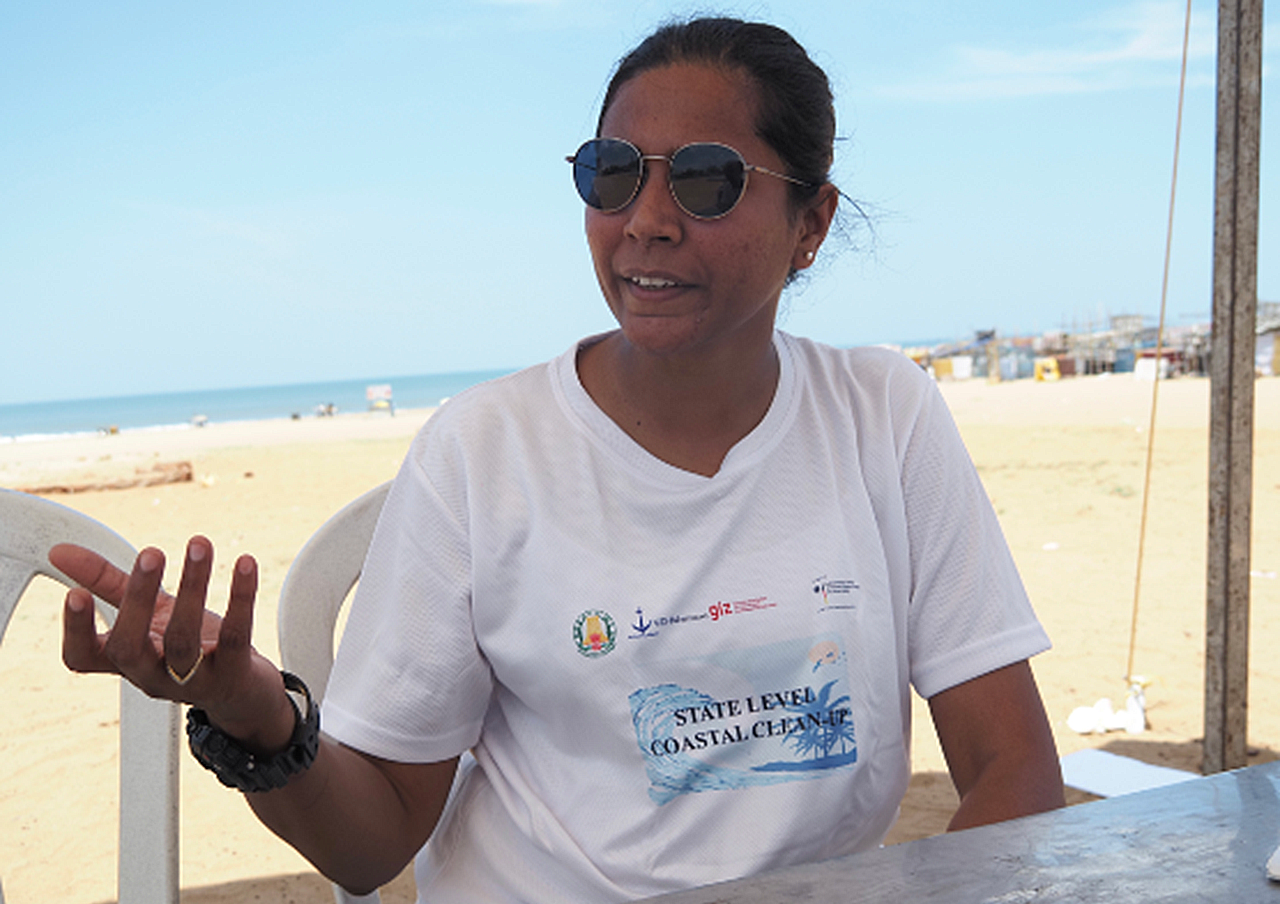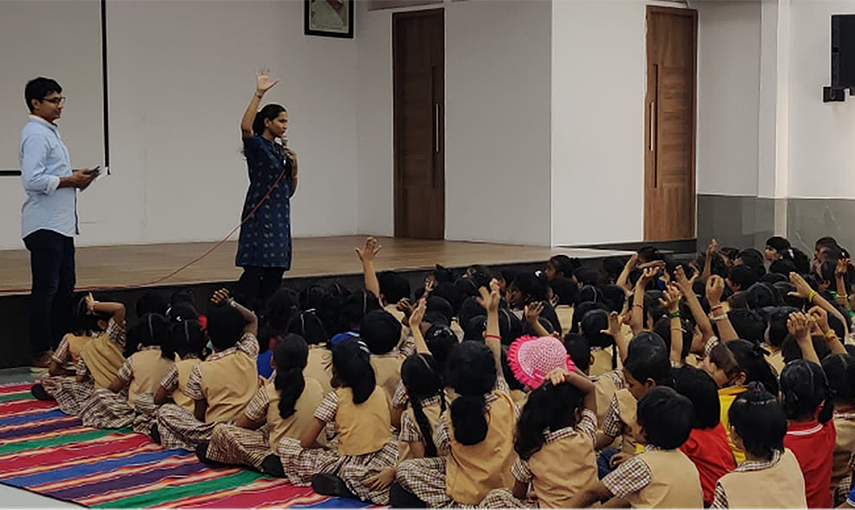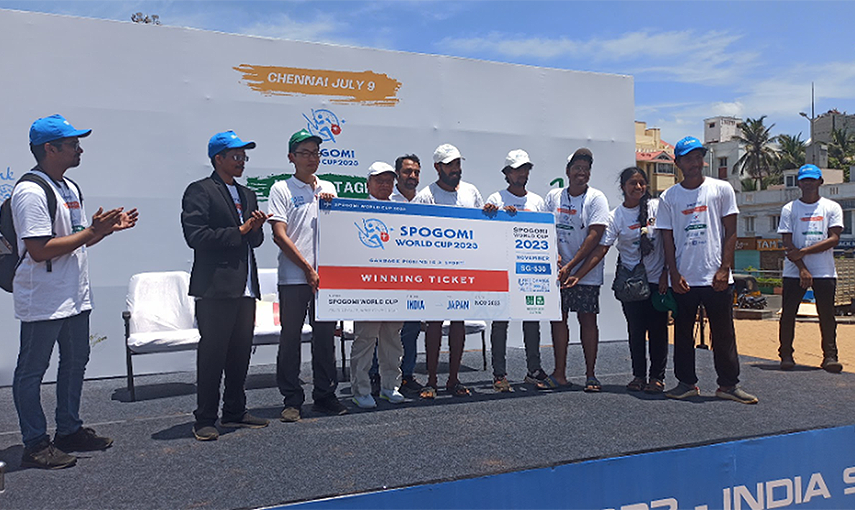INTERVIEW
【Why do you pick up trash? Vol.5】
in INDIA

The India stage took place under intense heat with a sensible temperature of over 40 degrees Celsius. Twenty-eight teams competed on the beach in Chennai, a city in southwestern India, and collected 317 kg of trash.
We interviewed Ms. DIVYA P VENKAT, representative of ViDHAI Recycling, a locally based environmental organization that helped organize the qualifying competition, about the waste situation in India and her thoughts on the environmental movement.
I am a plastics engineer in Chennai and I work extensively with plastics, including R&D, plastics processing and production, design, marketing, and recycling.
One time while visiting a garbage dump, I saw a situation where a child was playing with discarded plastic medical waste. Children were using discarded syringes and other objects as toys. It was this observation that inspired me to do something about the garbage problem.
――Please tell us about ViDHAI Recycling’s activities.
We work extensively on the environmental issue of plastics. In addition to beach cleanups and other cleanup activities, we teach children at schools about the plastic waste problem. For example, we teach children why disposable plastic bags are bad.
We also teach fishermen and their children about issues such as the dumping of fishing nets. Indian fishermen know little about the problem of marine plastics from discarded fishing nets. So, by teaching the children of fishermen about this issue, we aim to change the perception of the entire fishing industry.
When we started this activity in 2014, many people around us wondered why we let them engage in trash pickup after this education. However, people around us recently have recognized our enthusiasm and even volunteered to help us sort the waste.
ViDHAI has 25 employees, but it has others who volunteer to participate in our activities.
There are about 600 people who participate in cleanup activities at the beach. Many of these volunteers are students.


――How does India’s waste collection system work, and what are Indian people’s attitudes toward littering?
First of all, regarding waste collection in India, in the case of large cities such as Chennai, where the qualifier was held this time, the government generally manages the collection and disposal of garbage.
The public corporation under the control of the government contracts a private company to collect garbage from each house. The shifts for waste collection are morning, evening, and late night.
It is said that 60% of the trash littered in India is food-related waste.
People throw away a lot of trash at the end of the workday and go home. If there is a trash can, naturally they would throw it there, but often the cans are full and are overloaded with garbage.
India is a very populous country. And now there are so many young people. For adults, it is not easy to change their awareness about refuse, but young people are different. We would like to change this situation by approaching youth and children.

――What do you think about the way Indian society looks at litter pickers?
That is slowly starting to change as well.
Everyone had fun picking up trash at the SPOGOMI India Qualifier.
――SPOGOMI is different from ordinary trash pickup in many ways. What do you think is the significance and role of SPOGOMI?
SPOGOMI is a unique initiative that also attracts participants to pick up trash, and the participants are highly motivated by the fact that they will be able to visit Japan for this World Cup.
I also consider that SPOGOMI has greatly increased awareness of sorting. Consciousness of sorting is not so widespread in India, but I feel that the participants also gained an awareness of sorting.

――As you say, the point of SPOGOMI is not only to pick up but also to sort.
In ordinary beach cleanups, there is not much awareness of sorting, and the goal tends to be just to pick up the trash, but this is not the case with SPOGOMI, which is good.
Not everyone in India is aware of sorting, and many people throw things away without separating them or do not know how to separate them in the first place.
The qualifying competition this time was held at the beach, but we would like to build on the results of this year’s competition and expand it to the city as well.

I believe there are three steps.
The first is to raise public awareness. Each person needs to know what the problem is.
The second is a call to action. For example, calling people to stop using plastic bags is meaningless if they don’t know what to use instead. ViDHAI Recycling is sending out a message that by using organic bags, people can live without putting a burden on the environment, and we are actually handing out organic bags.
The third is policy advocacy. We encourage the government to develop policies to solve environmental problems, and we make it possible for the government to make efforts to solve environmental problems.
Ms. Divya P Venkat
Founded ViDHAI Recycling in 2014
Born: Chennai
Interests: Science fiction novels, big fan of Sherlock Holmes series
Favorite cricket team: Chennai Super Kings
Website: https://vidhairecycling.in/
Any last words?:
In this day and age of the looming threat of climate change, it is imperative to establish, create, and implement activities and sports such as SPOGOMI to bring awareness and sensitivity to social responsibility among citizens, especially children. Making trash pickup a sport sends a strong multifaceted message as well as demonstrates the importance of the SDGs; participating in SPOGOMI and winning the World Cup will show that we care about Mother Earth, nature, and our friends around us, and will pave the way for a newer future.
India, which now has the largest population in the world, has not yet developed social infrastructure to separate garbage and deter littering. We saw a lot of trash thrown away on roadsides and other places in the city. Under such circumstances, ViDHAI Recycling led by Ms. DIVYA was engaged in a wide range of activities to address the plastic problem. SPOGOMI hopes that this qualifier will help solve the plastic waste problem in India.